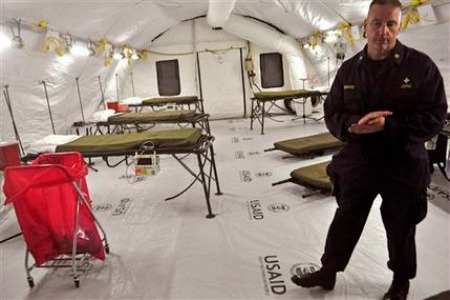
NEW YORK (AP) — U.S. officials on Thursday acknowledged disagreements over coordinating the international response to the Ebola epidemic in Liberia, but they say most issues are being worked out and the overall fight against the disease there seems to be succeeding.
In a call with reporters, the officials said disputes have erupted over matters like where to build new treatment centers and getting U.S. military helicopters to transport patients and blood samples from remote areas.
But they also minimized the debates, characterizing them as a natural and fleeting part of an intense and complicated battle against the largest Ebola epidemic in world history.
“The proof in the pudding is they get resolved. And we have seen progress in Liberia,” said Jeremy Konyndyk, director of USAID’s Office of U.S. Foreign Disaster Assistance.
Konyndyk joined Dr. Tom Frieden, director of the Centers for Disease Control and Prevention, to respond to a New York Times article Thursday spotlighting rocky coordination of efforts in Liberia. The Times cited the minutes of meetings between Liberian officials and representatives of foreign governments and aid groups assisting the West Africa nation, including the U.S., the United Nations and Doctors Without Borders.
Among the attendees were the CDC’s Dr. Kevin De Cock and Dr. Hans Rosling, a Swedish epidemiologist who is acting as a consultant to Liberian health officials.
In an interview with The Associated Press on Thursday from Liberia, De Cock said; “There are loads of reasons why the Ebola response is complicated – the logistics are extremely difficult and the resources are very limited, but it is not because people are fighting.”
Rosling – who is deeply involved in coordinating Liberia’s response – echoed De Cock.
“This is an emergency response and there will always be coordination challenges,” he said.
Rosling said that included altering plans as conditions on the ground change. For example, he said he had to persuade Swedish officials to drop plans to build a clinic in Liberia’s capital of Monrovia, and instead place it in a rural area where it is more needed.
“All this involves discussion, not hostility. At the end of the day, we laugh a lot and we are all friends. It’s an enormous challenge and everyone has the same goal, to stop Ebola,” he said.
The European Union’s coordinator for Ebola response said better coordination was needed – including between the hardest-hit nations of Liberia, Guinea and Sierra Leone.
“As the European Union and as an international community, we need to ensure that we assist these three countries to help each other, to work together at all levels, right from the president down to local authority level,” Christos Styliandes said Tuesday after returning from a visit to West Africa.
Since the spring, the Ebola epidemic that has sickened more than 15,100 people and caused more than 5,400 deaths, according to World Health Organization figures. A large international response wasn’t mounted, though, until late summer.
At the start, there are a number of groups trying to do different things, said Pieter Desloovere, a WHO spokesman in Liberia. “It is a challenge for the ministry of health to coordinate that and to have a good understanding of who is doing what and where,” he said.
Lately, the situation in Liberia seems to be improving, with significant declines in reported cases in recent weeks and empty beds in newly created Ebola hospitals. The U.S. military announced this week it is scaling back the size and number of treatment facilities it is building there.
But Ebola cases have surged recently in nearby Sierra Leone, remained unpredictable in Guinea, and begun to pop up in neighboring Mali.
Recent CDC reports attribute the progress in Liberia to better communications with the public, changes in burial practices and improved disease tracking and isolation, Frieden said.
“But that does not guarantee it will work” in the future, he said. “And it won’t, unless we double down on strategy at the front lines.”
